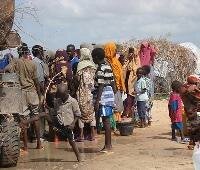Conflict, Climate Change, and Water Security in Sub-Saharan Africa
Issues:Climate change, Competition over resources
Climate Change and its variability is a phenomenon that cannot be pushed aside because of its potentail consequences and global scale. Its impacts have been suggested at different times by researchers to have favorable and unfavorable implications in different parts of the world.
Sub-Saharan Africa is home to about 635.2 million people (cited in Oduaran & Nenty, 2008), and is always in the world’s news, being the hot zone of the African continent that has been noted for its volatility and instability. Some of its countries are in protracted conflict. Climate change has been implicated by many literatures to multiply these tensions.
Natural resources are supposed to be the economic backbone of Sub-Saharan African countries. Some of these natural resources are also expected to be vulnerable to climate change. Experiments have suggested that conflict can be driven by natural resource degradation, scarcity and by competitive control of areas where resources are abundant (Myers 2004). Several researchers and authors have corroborated this position, with particular emphasis on water resources. Water is a natural resource of immense importance for every facet of life. Therefore, its potential distortion by climate change may interfere with human security, which has been proposed to be connected to water security.
This conflict tendency of the imminent effects of climate change in the world was also supported by the statement made by United Nations Secretary General, Ban ki Moon in March 1, 2007, when he said:
“The majority of the United Nations' work still focuses on preventing and ending conflict, but the danger posed by war to all of humanity and to our planet is at least matched by the climate crisis and global warming… [the effects of climate change are] likely to become a major driver of war and conflict.”
This statement shows why climate change should be given utmost research and policy consideration in every facets of our society.
This paper identifies poverty as a threat in Sub-Saharan Africa countries that will be exacerbated by water scarcity, analyzes the conflict implications of the supposed effects of climate change on water security in Sub-Saharan Africa, and advocates for sustainable water management as an ameliorative and mitigation approach to water security in Sub-Saharan Africa.
Poverty, Water Security and Climate Change in Sub-Sahara Africa
Many countries and its people in Sub-Saharan Africa are regarded as poor. These poverty levels are in variations. Poverty is a threat that affects every facets of human society, including water security. Poverty and conflict are sometimes linked together by researchers, conflict having been seen as both a cause and a consequence of poverty (Brown and Crawford, 2009). At the same time, human dignity and development have at most times been hindered in Sub-Saharan Africa by continued conflict.
The World Bank (2010) Poverty Data gives the statistical data of the Sub-Saharan Africa poverty headcount ratio in 2005 as $1.25 a day (PPP): 50.9%, and $2 a day (PPP): 72.9%. This data attetsts to the extraordiary level of poverty being witnessed in the region. The conflict atmosphere in some of the nations in the Sub-Sahara Africa has visible socio-economic implications on sustainable development and invariably exacerbates the impoverishment of the people.
Laplante (2009) surmised that there is existing empirical evidence clearly demonstrating a positive correlation between poverty (or economic development) and the impacts of climate change. Several researchers have also interlinked poverty to climate change vulnerability and adaptation (Mckee and Suhriki, 2005 cited in Confalonieri, 2005, Watson et. al., 1997 cited in O’Brien and Leicheko 2002, AFP, 2007). This poverty and climate change nexus may have implications for water security, thereby instigating stress on the people.
As I have argued in previous papers, “Water is practically an issue tied with the existence of life because of its importance in nearly every area of development including sustaining life on the planet earth” (Akiyode, 2010). Water security is important to environmental sustainability and paramount to the sustenance of societal peace. Therefore, the goal of human society and challenges of the world’s poor countries including Sub-Saharan Africa must be to achieve water security (Grey and Sadoff 2007).
Read the rest of the article at peace and conflict monitor
Image source: Abdurrahman Warsameh for the International Relations and Security Network
 Delicious
Delicious Digg
Digg StumbleUpon
StumbleUpon Reddit
Reddit
Posted on 8/09/11

Comments
Post new comment